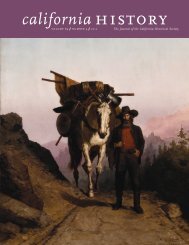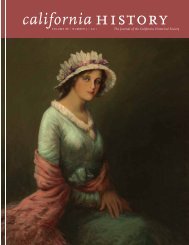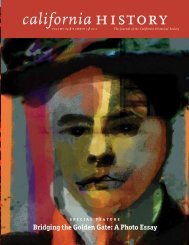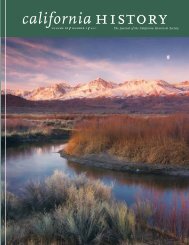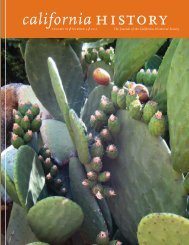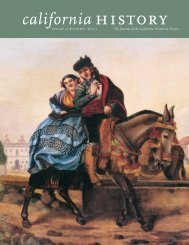Woman Suffrage Association to push for universalenfranchisement. As of 1892, however, Wyomingwas the only state in which females couldvote. When the general assembly in Sacramentopassed a suffrage bill in 1893, <strong>California</strong> lookedas if it might become the second state. Thegovernor’s ruling against the constitutionalityof the legislation forced suffrage proponents toregroup. Three years later, they succeeded in placingon the ballot an amendment to <strong>California</strong>’sconstitution granting women the franchise. Itwon favor with the male voters of Los Angeles,where Caroline had helped to lay the groundworkfor acceptance, but went down to overwhelmingdefeat elsewhere in the state. 64A decade passed before the suffrage issuereemerged in <strong>California</strong>. By this time, womenhad been granted the right to vote in Colorado,Utah, Idaho, and Washington State. Caroline wasnow in her mid-eighties. To show their appreciationof the inspirational leadership she had previouslyprovided, her younger colleagues appointedher to honorary presidencies in suffrage andequity leagues formed to push again for the franchise.This time, suffrage proponents carefullyforged alliances with labor organizations andProgressives. At a special election on October 10,1911, <strong>California</strong> became the sixth and largest stateto enfranchise women. 65Caroline Maria Seymour Severance, who diedin 1914 at the age of ninety-four, would not liveto see national suffrage achieved with passagein 1920 of the Nineteenth Amendment to theConstitution prohibiting the states and federalgovernment from denying any American citizenthe right to vote on the basis of gender. But shehad savored victory, casting her first vote in apresidential election in 1912. In recognition ofher fragility, she had been allowed to register athome, whose name Caroline had changed to ElNido following T.C.’s death. 66The registration ceremony, according to areporter who witnessed it, took place a weekafter the special election, perhaps on El Nido’sshady veranda screened by Japanese curtains andfurnished with easy chairs and two hammocks.Then in her early nineties, Caroline passed mostof her time reclined in a hammock, dictatingto her secretary or listening to her read aloudfrom “serious and instructive books.” Becauseof the importance of the occasion, Caroline was“allowed to sit up” to sign the registration book.In the space provided to list one’s occupation shewrote “Mother of Clubs,” an honorific that hadbeen bestowed on her by the activist women ofLos Angeles. Describing the day as among herproudest, she declared, “At ninety-two I havegained my majority.” Her formal statement,issued the day after the special election, showedthat, despite her physical infirmity, she retainedher spitfire: “We have come to the dawn of a glorioustomorrow! A landmark in the most sacredcrusade of the ages, when woman is heroicallyreleased from the bondage and superstition ofthe past, and liberated from the political blacklistin our own free country. . . . Your loving comrade,C. M. Severance.” 67Diana Tittle, a former magazine writer and editor, is theauthor of The Severances: An American Odyssey, from PuritanMassachusetts to Ohio’s Western Reserve, and Beyond. In 1997she received the Cleveland Arts Prize for Literature for hernonfiction books on regional <strong>history</strong> and urban affairs. <strong>California</strong> History • volume 88 number 1 2010
n o t e s12People’s Park: Birth and Survival, By Ibid, 48. W. J. Rorabaugh (Berkeley at War,Jon David Cash, PP 8–29139) describes the Joy of Cooking as a groupunique among Bay Area bands because itCaption sources: Wendy Marian Schlesinger, “played mainly in Berkeley” and “its two“People’s Park, April 20, 1969–May 15, songwriters and lead singers were women.”1969: 26 Days That Shook Our World” Rorabaugh notes that Joy of Cooking “wasin The Whole World’s Watching: Peace and lionized locally for its feminist message.”Social Justice Movements of the 1960s and 131970s (Berkeley, CA: Berkeley Art Center, Griffith, “People’s Park,” 15.2001), 105–112; Interview with Wendy14 Scheer, “Dialectics,” 48; Rorabaugh,(Schlesinger) Stevens, Aug. 31, 2010, Berkeley;Stew Albert, Berkeley Barb, Apr. 18,15Berkeley at War, 84–85.1969; “People’s Park: Free for All,” Berkeley “Stew Albert”—Wikipedia, the freeBarb, Apr. 25–May 1, 1969; W. J. Rorabaugh,encyclopedia, http://en.wikipedia.org/wiki/Berkeley at War: The 1960s (New York:Stew_Albert; Judith Clavir Albert and StewartOxford University Press, 1989), 157.Edward Albert, The Sixties Papers: Documentsof a Rebellious Decade (New York: Praeger,1 Sim Van der Ryn, “Building a People’s 1984), xix; Stew Albert, Who the Hell is StewPark,” in The Troubled Campus: Current Albert? (Los Angeles: Red Hen Press, 2004),Issues in Higher Education, ed. G. Kerry 32–71; Kirkpatrick Sale, SDS: The Rise andSmith (San Francisco: Jossey-Bass, Inc., Development of the Students for a Democratic1970), 70.<strong>Society</strong> (New York: Random House, 1973),2 Robert Scheer, “Dialectics of Confrontation:Who Ripped Off the Park,” Ramparts46; Jerry Rubin, Do It! Scenarios of the Revolution(New York: Touchstone, 1970), 26.(Aug. 1969): 43; Peter Allen, “Violent16 “Stew Albert”—Wikipedia; Albert, WhoDesign: People’s Park, Architectural Modernism,and Urban Renewal,” ISSC Fellows Governor, The “People’s Park,” 4; Todd Gitlin,the Hell is Stew Albert?, 56–99; Office of theWorking Papers, UC Berkeley (Berkeley, CA: The Sixties: Years of Hope, Days of Rage (NewInstitute for the Study of Social Change, York: Bantam Books, 1987), 211.2007), http://escholarship.org/uc/item/ 176vz4s7jj, 10.“Truthing: About the Author,” http://www.truthing.net/author.asp; Scheer, “Dialectics,”3 Scheer, “Dialectics,” 43.48.4 Rorabaugh, Berkeley at War: The 1960s, 145. 18 Rorabaugh, Berkeley at War, 19–37; MiltonViorst, Fire in the Streets: America in5 Scheer, “Dialectics,” 44; Winthrop Griffith,“People’s Park—270’ x 450’ of Confrontation,”New York Times Magazine (Junethe 1960s (New York: Simon and Schuster,1979), 285–99.29, 1969): 5–6; Frederick Berry, Thomas 19 Rorabaugh, Berkeley at War, 38–41; Viorst,Brooks, and Eugene Cummins, “The BerkeleyPark: Terror in a Teapot,” Nation (June ernor, The “People’s Park,” 3, 5.Fire in the Streets, 300–2; Office of the Gov-23, 1969): 784.20 Sale, SDS, 376–77.6 Allen, “Violent Design,” 15; Scheer,21“Dialectics,” 46; Berry et al., “The BerkeleyPark,” 784; “The Battle of Berkeley,”Office of the Governor, The “People’sPark,” 4; Rorabaugh, Berkeley at War, 99,National Review (June 17, 1969): 579.109, 148, 155.227 Scheer, “Dialectics,” 44, 46; John R.Fat Bill and Me, “Super Joel Tornabene,Coyne, Jr., “Positively the Last Word onPeople’s Park, and Berkeley in the Earlythe People’s Park,” National Review (Oct. 7,70s,” fatbillandme.blogspot.com/…/protest-photos-super-joel-or-hibiscus.html;1969), 1025.Paul Krassner, “Tom Waits Meets Super8 Scheer, “Dialectics,” 46; Berry et al., Joel,” www.counterpunch.org/krassner/02022008.html;Daniel Walker, Rights“The Berkeley Park,” 784; Allen, “ViolentDesign,” 19–20.in Conflict (New York: Bantam Books, 1968),9 Scheer, “Dialectics,” 48; Griffith, “People’six., 89–90; Abbie Hoffman, Revolution forPark,” 15.the Hell of It (New York: Dial Press, 1968),133.10 Ibid.23 In his study of the 1960s protest of youth,11 Scheer, “Dialectics,” 48. Kenneth Keniston described “two polesof dissent,” separate groups that Kenistonlabeled as the “politically active” and “culturallyalienated.” Kenneth Keniston, Youth andDissent: The Rise of a New Opposition (NewYork: Houghton Mifflin Harcourt, 1971),143.24 “The Street People,” Time (May 23, 1969):27; Office of the Governor, The “People’sPark,” 2–3; Rorabaugh, Berkeley at War, 156;Scheer, “Dialectics,” 48.25 Scheer, “Dialectics,” 48; WendySchlesinger, “Sod,” in Wendy Schlesinger,“Young Girl’s Diary—Berkeley 1968–1969,”http://www.peoplespark.org/sod.html.26 Scheer, “Dialectics,” 48.27 William Brand, “People’s Park AdvocateSuccumbs to Cancer,” Oakland Tribune, Feb.8, 2006; Albert and Albert, Sixties Papers,434–36; Albert, Who the Hell is Stew Albert?,101; “People’s Park”–Wikipedia; RichardBrenneman, “The Bloody Beginnings ofPeople’s Park,” Berkeley Daily Planet, Apr.20, 2004.28 F. J. Bardacke, “Who Owns the Park?:A Leaflet,” Berkeley Barb, May 9, 1969,reprinted in Albert and Albert, SixtiesPapers, 437–38; Scheer, “Dialectics,” 49;John A. Coleman, “The People, The Police,and the Park,” America (June 7, 1969): 668.29 “The People’s Park,” Newsweek (May 26,1969): 39; Allen, “Violent Design,” 28–29;Van der Ryn, “Building a People’s Park,”68; Berry et al., “The Berkeley Park,” 785;Griffith, “People’s Park,” 5; San FranciscoChronicle, May 16, 1969.30 Brand, “People’s Park Advocate.” Thechasm that once existed in the Bay Areabetween political activists and the counterculturecan best be illustrated by their intersectionat two important events. First, inOctober 1965, the Vietnam Day Committeewelcomed to Berkeley a crowd of 10,000–15,000 for Vietnam Day, a massive teach-inopposing the war. Ken Kesey, author ofOne Flew Over the Cuckoo’s Nest and a localcountercultural icon who had popularizedthe use of LSD with a series of “acid tests,”was an invited speaker. Taking the stagewith a harmonica and playing “Home onthe Range,” pausing periodically to accusethe VDC of “playing their game” by makingspeeches and planning marches, he finallyadvised antiwar activists that the only way tostop the war was simply to turn their backson it and walk away. Later, in January 1967,the counterculture staged a Human Be-Inat San Francisco’s Golden Gate Park, wherea crowd of 20,000–50,000 gathered and
- Page 3: california historyvolume 88 number
- Page 6 and 7: c o l l e c t i o n sAdmission tick
- Page 8 and 9: c o l l e c t i o n sBusiness cards
- Page 10 and 11: People’s Park:Birth and SurvivalB
- Page 12 and 13: even on existing dorms due to the h
- Page 14 and 15: The attraction, however, was fleeti
- Page 16 and 17: Bay Area—North Beach and Haight-A
- Page 18 and 19: A hundred students, activists, and
- Page 20 and 21: are building a park on the land. We
- Page 22 and 23: and illegal drug use in the park. T
- Page 24: without even allowing Siegel to con
- Page 27 and 28: As Bloody Thursday came to a close,
- Page 29 and 30: this state.” On June 20, Reagan t
- Page 31 and 32: Denovo, her autopsy revealed a down
- Page 33 and 34: ation and encouragement, and shed n
- Page 35 and 36: the guardians of her children. The
- Page 37 and 38: mitted to visit Caroline in her new
- Page 39 and 40: Sojourner Truth gave what famously
- Page 41 and 42: After emancipation, she helped to o
- Page 43 and 44: This 1885 view captures the sparsel
- Page 45 and 46: But Caroline thought it imprudent t
- Page 47 and 48: The “Mother of Clubs”In Boston,
- Page 49 and 50: Caroline attended the September 189
- Page 51 and 52: ments, Seymour and Sibley earned pe
- Page 53: In this photograph, San Francisco s
- Page 57 and 58: 1969; McGill, The Year of the Monke
- Page 59 and 60: that “thousands of the brightest
- Page 61 and 62: For Both Cross andFlag: Catholic Ac
- Page 63 and 64: d o n o r sThe California Historica
- Page 65 and 66: In Kind DonationsSandy Alderson, Sa
- Page 67: Membership BenefitsJoin tHeCaliforn



